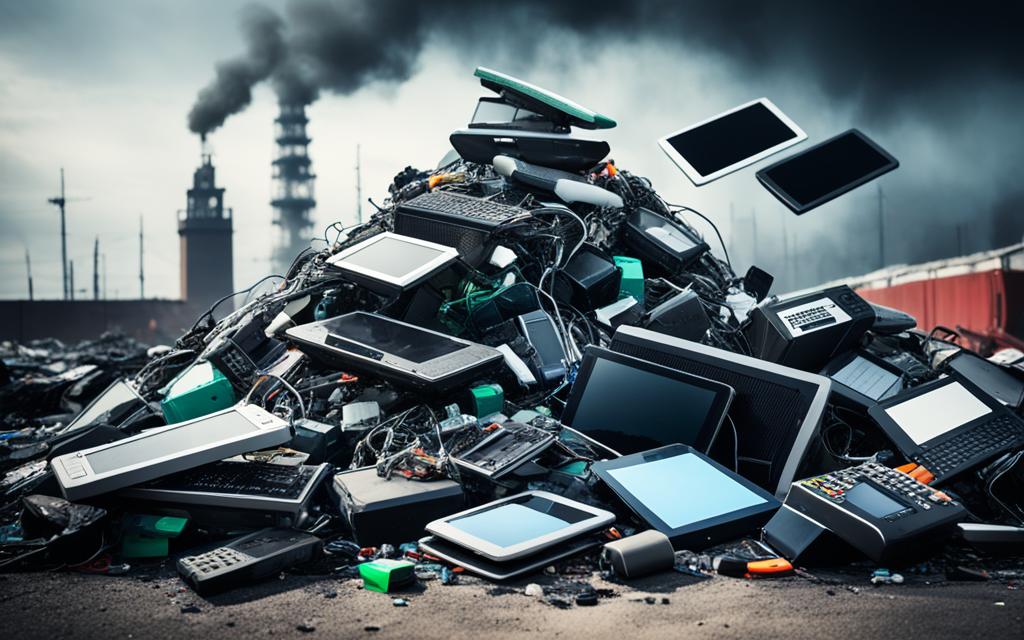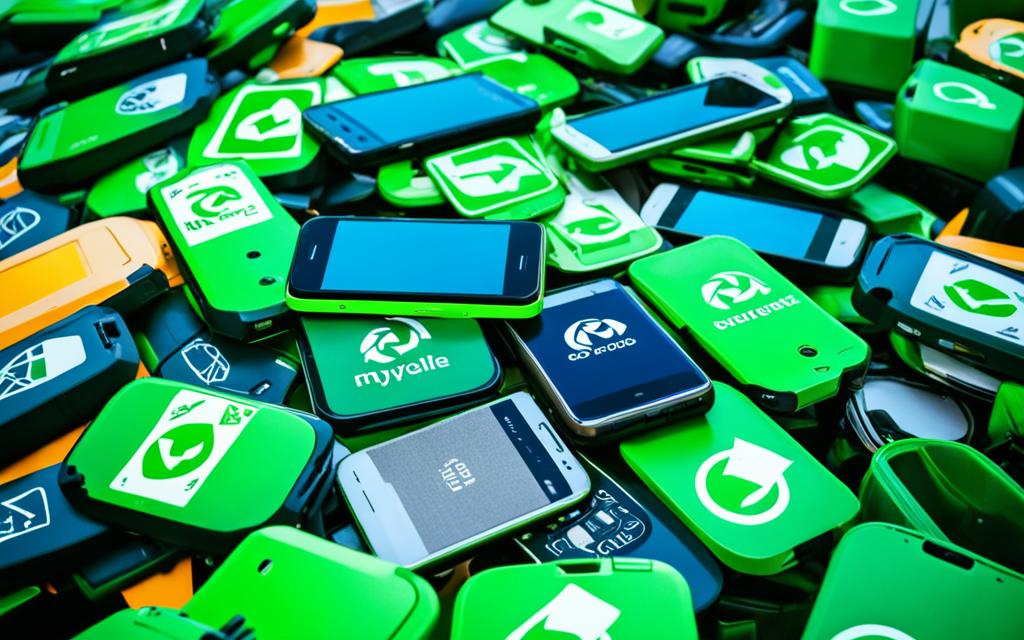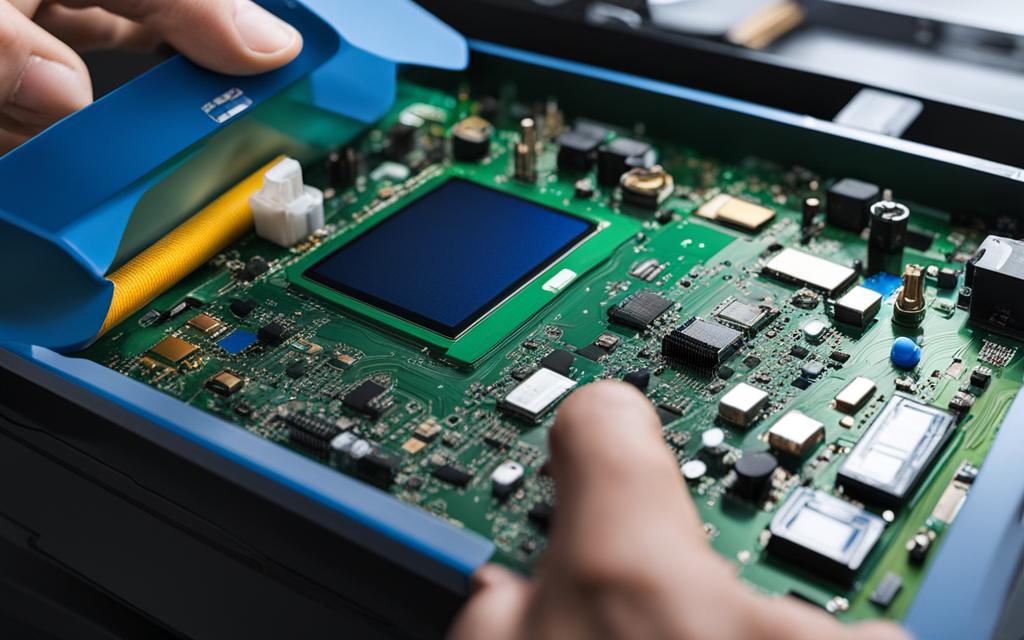Corporate Responsibility in Mobile Phone Recycling
Welcome to our article on corporate mobile phone recycling, environmental stewardship, and sustainability. In today’s digital age, mobile devices have become an integral part of our lives, but their rapid turnover also presents environmental challenges. As responsible businesses, we have a duty to address these challenges and take actions that promote a sustainable future.
The Impact of Mobile Phone Disposal on the Environment
Mobile devices, including cell phones, play a significant role in the global e-waste problem. Every year, billions of phones are discarded, contributing to the ever-growing electronic waste crisis. Shockingly, the average lifespan of a cell phone is just 2.6 years, exacerbating the issue further.
Improper disposal of mobile devices has severe consequences for the environment. When discarded in landfills or incinerated, these devices release toxic chemicals such as lead, mercury, cadmium, and brominated flame retardants. These substances contaminate soil, water sources, and the air we breathe, posing serious health risks to humans, wildlife, and ecosystems.
“The improper disposal of mobile devices releases hazardous substances into the environment, polluting our planet and endangering lives.”
The global e-waste problem has reached critical levels, with the United States being one of the leading contributors. However, recycling mobile devices offers a solution to this pressing issue. Not only does proper recycling prevent the pollution caused by electronic waste, but it also allows for the recovery and reuse of valuable materials found in these devices.
Mobile phones contain precious metals like copper, silver, gold, and palladium. Recycling these devices enables the retrieval of these resources, reducing the need for environmentally damaging mining activities. It also conserves energy and reduces greenhouse gas emissions associated with the extraction and production of new materials.
By recycling mobile devices, we can minimize the environmental impact, preserve natural resources, and promote a more sustainable future.
The Global E-Waste Problem: A Call for Action
The mounting electronic waste problem demands immediate attention and collective action. Here are a few eye-opening statistics:
| Statistic | Value |
|---|---|
| Total electronic waste generated globally in 2020 | 53.6 million metric tonnes |
| Percentage of electronic waste recycled globally | 17.4% |
| Total value of materials discarded in electronic waste globally | US$57 billion |
| Expected growth of electronic waste by 2030 | 38% |
These figures paint a grim picture of the escalating crisis that demands urgent action. It is crucial for individuals, businesses, and governments to prioritize responsible electronic waste management and embrace sustainable practices, such as mobile phone recycling, to mitigate the harmful effects on our planet.
By taking proactive steps to address the global e-waste problem, we can safeguard the environment, protect public health, and build a more sustainable future for generations to come.
The Importance of Mobile Phone Recycling for Businesses
Mobile phone recycling offers several benefits for businesses. By recycling old devices, companies can achieve significant cost savings. Instead of storing outdated phones, which take up valuable space and require maintenance, businesses can recycle them and free up resources for more productive use. Additionally, recycling minimizes potential legal liabilities that arise from data breaches. By responsibly disposing of old devices, businesses can safeguard sensitive information and protect themselves from lawsuits and reputational damage.
Furthermore, mobile phone recycling ensures compliance with regulations such as the Waste Electrical and Electronic Equipment (WEEE) Directive. This directive mandates the proper recycling and disposal of electronic waste and holds businesses accountable for their environmental impact. By participating in recycling programs, businesses demonstrate their commitment to sustainability and data security in accordance with industry regulations.
Recycling programs also provide secure data wiping services, ensuring that all confidential business information is properly erased from mobile devices. This protects businesses from potential data leaks and ensures the privacy of employee and customer data. By emphasizing the importance of data security, businesses can build trust with their stakeholders and enhance their reputation as responsible and trustworthy organizations.
Implementing a mobile phone recycling program is a proactive step towards achieving cost savings, data security, and compliance with regulations. Recycled devices not only contribute to a cleaner environment but also demonstrate a business’s commitment to responsible waste management and sustainability practices. By embracing mobile phone recycling, businesses can position themselves as leaders in their industry, attract environmentally conscious customers, and foster a culture of environmental responsibility.
Benefits of Mobile Phone Recycling for Businesses:
- Achieve significant cost savings through reduced storage and maintenance expenses
- Minimize legal liabilities by ensuring proper disposal of mobile devices
- Ensure compliance with regulations such as the WEEE Directive
- Enhance data security by partnering with recycling programs that offer secure data wiping
- Strengthen reputation as an environmentally responsible and sustainable business
Characteristics of a Quality Mobile Device Recycling Program
A quality mobile device recycling program encompasses various essential characteristics that ensure its effectiveness and contribution to environmental sustainability. Implementing these characteristics can lead to a successful recycling program that accepts all devices, regardless of their age or condition, and promotes responsible handling of electronic waste.
1. Accessibility
An accessible mobile device recycling program aims to make recycling easy and convenient for individuals and businesses alike. It provides accessible collection points and multiple drop-off locations to encourage participation. By offering accessible options, such as mail-in services or collection events, individuals can easily contribute to the program and take a proactive role in environmental preservation.
2. Certified Partners
A quality recycling program establishes partnerships with certified recycling and repair partners who adhere to industry-leading standards. Working with certified partners ensures that the recycling process is carried out responsibly and in compliance with recycling laws and regulations. These partners have the necessary expertise to handle electronic waste correctly, minimizing environmental impact and maximizing resource recovery.
3. Compliance
Compliance with recycling laws and regulations is a crucial aspect of a quality recycling program. It involves adhering to the Waste Electrical and Electronic Equipment (WEEE) Directive and other relevant legislation. Compliance ensures that the program operates within legal boundaries, follows the best practices for waste disposal, and contributes to the overall goal of environmental preservation.
4. Data Wiping
Thorough and efficient data wiping is an essential component of a quality mobile device recycling program. It guarantees the removal of personal and corporate information from devices before they enter the recycling process. Data wiping protects individuals and businesses from potential data breaches and ensures the privacy and security of sensitive information. Certified data-wiping processes provide peace of mind and maintain the integrity of the recycling program.
By incorporating these characteristics into a mobile device recycling program, individuals and businesses can actively contribute to environmental sustainability, minimize electronic waste, and make a positive impact on the planet.
Tangoe’s Mobile Device Recycling Services
Tangoe is a leading provider of mobile device recycling services, offering certified recycling partners and cutting-edge data-wiping processes. With a commitment to environmental sustainability, Tangoe’s facilities are R2 certified and zero-waste-to-landfill certified, ensuring responsible waste reduction and disposal.
One of the key advantages of partnering with Tangoe is their ability to provide clients with tracked environmental impact data. This data allows businesses to measure and understand the positive environmental impact of their mobile device recycling efforts. Tangoe’s transparent reporting helps organizations demonstrate their commitment to sustainability and make data-driven decisions to further reduce their environmental footprint.
In addition to environmental impact data, Tangoe leverages real-time market pricing intelligence to accurately estimate the value of recycled mobile devices. This market intelligence ensures that businesses receive fair and competitive prices for their devices, enhancing the financial benefits of recycling while incentivizing further participation.
Furthermore, Tangoe understands the critical importance of data security during the recycling process. To address this concern, Tangoe offers insurance against mobile data leaks, providing comprehensive data security throughout the entire recycling journey. Clients can have peace of mind knowing that their sensitive information will be securely handled and wiped from recycled devices.
Overall, Tangoe’s mobile device recycling services offer businesses a comprehensive solution for sustainable and secure disposal of their electronic devices. With certified recycling partners, accurate environmental impact data, and market pricing intelligence, Tangoe sets the standard for responsible and efficient mobile device recycling.
| Key Features of Tangoe’s Mobile Device Recycling Services | Benefits |
|---|---|
| Certified recycling partners | – Ensures compliance with industry-leading standards – Demonstrates commitment to responsible recycling |
| Tracked environmental impact data | – Enables measurement and reporting of environmental progress – Enhances transparency and stakeholder trust |
| Real-time market pricing intelligence | – Fair and competitive prices for recycled devices – Maximizes financial returns for businesses |
| Insurance against mobile data leaks | – Comprehensive data security throughout the recycling process – Safeguards sensitive information |
Benefits of Mobile Phone Recycling for the Environment
When it comes to environmental responsibility, mobile phone recycling plays a crucial role in reducing electronic waste and promoting eco-friendliness. By recycling old devices, valuable materials are prevented from ending up in landfills, contributing to a cleaner planet and a more sustainable future.
Electronic waste is a significant concern due to its harmful consequences on the environment. Mobile devices, including cell phones, contribute to this growing problem, as billions of phones are disposed of each year. However, recycling these devices not only prevents pollution but also allows for the recovery of valuable materials such as copper, silver, gold, and palladium. This reduces the need for extracting new resources and helps to conserve our natural environment.
Responsible disposal of electronics also showcases a company’s commitment to eco-friendliness and can attract environmentally conscious customers. In today’s society, consumers are increasingly prioritizing businesses that demonstrate environmental responsibility. By implementing a mobile phone recycling program, companies can position themselves as champions of sustainability and gain a competitive edge in the market.
“Environmental responsibility is not only about reducing our carbon footprint; it’s also about making conscious decisions regarding the lifecycle of our products. Mobile phone recycling is a tangible way for businesses to showcase their commitment to the environment and make a positive impact.”
Environmental Benefits of Mobile Phone Recycling
Mobile phone recycling offers several key environmental benefits, including:
- Reduction of electronic waste: Recycling old devices prevents valuable materials from ending up in landfills, reducing the overall volume of electronic waste.
- Conservation of resources: Recovering materials from recycled phones reduces the need for extracting new resources, conserving natural reserves and reducing the environmental impact of resource extraction processes.
- Prevention of pollution: Proper disposal of mobile devices helps prevent the release of toxic chemicals into the environment, safeguarding ecosystems and human health.
- Energy conservation: Recycling mobile phones requires less energy than manufacturing new devices, leading to reduced greenhouse gas emissions and energy consumption.
Comparison of Environmental Impact
| Recycling | Landfill |
|---|---|
| Prevents pollution | Contributes to soil and water pollution |
| Reduces greenhouse gas emissions | Increases carbon footprint |
| Conserves natural resources | Requires new resource extraction |
| Helps combat climate change | Contributes to environmental degradation |
By choosing to recycle mobile phones, businesses and individuals alike can actively participate in the reduction of electronic waste, protect the environment, and contribute to a greener, more sustainable future. Every phone recycled makes a difference, and together, we can create a positive impact for generations to come.
Cost-Saving Potential of Mobile Phone Recycling
When it comes to the disposal of old mobile devices, businesses have a lot to gain from implementing a mobile phone recycling program. Not only does recycling contribute to environmental stewardship, but it also offers significant cost savings and financial incentives. Let’s explore how recycling old devices can help businesses reduce expenses and improve their bottom line.
The Benefits of Recycling
- Elimination of Storage Space Requirements: Recycling old devices eliminates the need for businesses to allocate valuable space for storing outdated or unused mobile phones. This frees up space that can be better utilized for other purposes, such as inventory or staff facilities.
- Reduction in Maintenance Costs: Keeping old mobile devices in storage or discarding them improperly can lead to unnecessary maintenance costs. By recycling these devices, businesses can reduce their maintenance expenses and allocate those funds towards more essential areas of their operations.
- Financial Incentives: Some mobile phone recycling programs offer financial incentives to businesses for participating in their recycling initiatives. These incentives can come in the form of cash payments, trade-in credits, or discounts on future purchases. By taking advantage of these incentives, businesses can further reduce their overall expenses, boosting their cost savings even more.
By leveraging the cost-saving potential of mobile phone recycling, businesses can not only contribute to a cleaner environment but also improve their financial performance. It’s a win-win situation that aligns corporate responsibility with sustainable business practices.
Implementing a mobile phone recycling program is a smart and eco-conscious decision for any business striving to reduce costs and enhance their environmental impact. The financial incentives and cost savings that come with recycling old devices can make a significant difference to a company’s bottom line. Moreover, by embracing recycling, businesses showcase their commitment to responsible waste management and environmental sustainability, attracting customers and partners who value these principles.
Conclusion
Implementing a mobile phone recycling program is not only a matter of corporate responsibility but also a strategic decision that can bring multiple benefits to businesses. By embracing such a program, companies can significantly reduce costs, enhance data security, ensure compliance with regulations, and position themselves as eco-conscious and responsible organizations.
A mobile phone recycling program offers a cost-effective solution for businesses, eliminating the need for storage space and reducing maintenance expenses. Moreover, it provides the added advantage of financial incentives from recycling programs, further contributing to overall savings.
By prioritizing data security through proper and certified data wiping procedures, businesses can safeguard sensitive information from potential breaches during the recycling process. This increased data security ensures that companies stay compliant with regulations, such as the Waste Electrical and Electronic Equipment (WEEE) Directive, while also protecting their reputation.
Ultimately, incorporating a mobile phone recycling program into a company’s business strategy sends a powerful message of environmental stewardship. This proactive approach allows businesses to contribute to a cleaner planet by reducing electronic waste and showcasing their commitment to sustainability. Customers and partners who value eco-conscious organizations are more likely to be attracted to businesses that prioritize mobile phone recycling, establishing a positive image and setting a great example as responsible corporate citizens.
FAQ
What is the impact of mobile phone disposal on the environment?
Improper disposal of mobile devices contributes to the global electronic waste problem, releasing toxic chemicals into the environment. Recycling mobile phones prevents pollution and allows for the recovery of valuable materials.
Why is mobile phone recycling important for businesses?
Mobile phone recycling allows businesses to save on storage space, maintenance costs, and potential legal liabilities. It ensures compliance with regulations and enhances data security, showcasing environmental responsibility.
What are the characteristics of a quality mobile device recycling program?
A quality program accepts all devices regardless of age or condition. It establishes partnerships with certified recycling/repair partners, adheres to industry-leading standards, and ensures thorough data wiping and proper documentation.
What services does Tangoe offer for mobile device recycling?
Tangoe offers mobile device recycling services with certified partners and NIST certified data-wiping processes. Their facilities are R2 certified and zero-waste-to-landfill certified. They provide tracked environmental impact data and insurance against mobile data leaks.
What are the benefits of mobile phone recycling for the environment?
Mobile phone recycling prevents valuable materials from ending up in landfills, reducing electronic waste and its harmful consequences. It showcases a company’s commitment to environmental responsibility and attracts environmentally conscious customers.
How does mobile phone recycling offer cost savings for businesses?
Recycling old devices eliminates storage space requirements and reduces maintenance costs. Some recycling programs even provide financial incentives, further reducing overall expenses for businesses.













